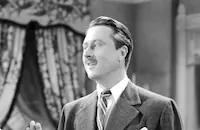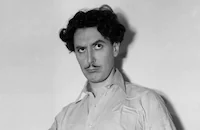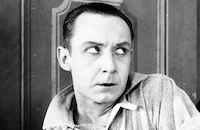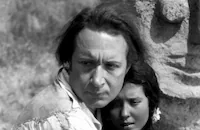The Horn Blows at Midnight

Brief Synopsis
Cast & Crew
Raoul Walsh
Jack Benny
Alexis Smith
Dolores Moran
Allyn Joslyn
Reginald Gardiner
Film Details
Technical Specs

Synopsis
After the third trumpet player in a radio station orchestra falls asleep during a lulling coffee commercial, he dreams he is the angel Athanael, third trumpet player in the heavenly orchestra. One day Athanael is summoned to the Department of Small Planet Management. There, the Chief tells Athanael that conditions on Earth are so bad that the planet must be destroyed and that Elizabeth, the Chief's receptionist, has persuaded him to send Athanael, with whom she is in love, to blow the horn that will signal the end of the world.
The Chief instructs Athanael to blow the horn exactly at midnight as no other time will produce the desired effect and warns him that two other angels, Osidro and Doremus, who failed to blow the horn as instructed, now live on Earth as fallen angels. Carrying the special trumpet, Athanael descends to Earth through a hotel elevator. Osidro and Doremus recognize Athanael as he leaves the elevator and, realizing that the end is near, plan to prevent him from blowing his horn. Meanwhile, dapper jewel thief Archie Dexter plots with Fran, the hotel cigarette girl, to steal a strand of pearls belonging to Lady Stover. When Fran bungles the job, Archie coldly tells her he no longer loves her, and Fran retreats to the roof, where she contemplates suicide. Athanael is also on the roof, waiting for the stroke of midnight, but misses the moment when he stops Fran from committing a sin by jumping off the building. Now that Athanael is a fallen angel, he auditions for a jazz band and is booed off the stage. After he stops in a café for a meal, he is forced to leave his trumpet in lieu of a cash payment.
In the meantime, Elizabeth persuades the Chief to allow Athanael a second chance. The Chief permits Elizabeth to join Athanael and tell him the news. On Earth, Elizabeth wins five dollars in a contest and gives the money to Athanael so that he can redeem his trumpet. When Osidro and Doremus learn that Athanael has another chance to blow the horn, they offer Archie $10,000 to steal the trumpet. While Archie and Fran distract Elizabeth and Athanael, Humphrey Rafferty, Archie's associate, unsuccessfully attempts to steal the trumpet. After several complications, the Chief arrives on Earth, and determined to fulfill his assignment, Athanael grabs the trumpet and rushes to the roof. Warning the others to keep their distance, Athanael accidentally falls off the roof.
The others grab him, but during their attempt to pull him up, they also fall over the edge. While dangling at the end of a chain of people, Athanael drops into a huge coffee cup that is part of an advertisement. He hears the clock strike midnight and is about to blow his horn when he tumbles out of the coffee cup and wakes to discover that he has been dreaming the entire event. He then tells Elizabeth, who plays the harp in the orchestra, that his dream was so crazy that if they made it into a movie, nobody would believe it.

Director

Raoul Walsh
Cast

Jack Benny

Alexis Smith

Dolores Moran

Allyn Joslyn

Reginald Gardiner

Guy Kibbee

John Alexander

Franklin Pangborn

Margaret Dumont

Bobby Blake
Ethel Griffies

Paul Harvey

Mike Mazurki
Truman Bradley

Frank Craven
Emma Dunn
Murray Alper

James Burke
John Brown
Tommy O'neill
Francis Pierlot
Oliver Prickett
Carl Harbaugh
Dudley Dickerson
Joe Herrera
Pat O'moore
Joan Winfield
Virginia Patton
Dink Trout
Sidney Miller
Jack George
Marjorie Henshaw
Betty Alexander

John Alvin

Steve Richards
Joy Barlowe
Harry Rosenthal
Larry Rio
Red Stanley
Charles Jordan

Monte Blue

Richard Lane
Harry Seymour
Sondra Johnson
Earle Hodgins
Jimmy Ames
Pat Hogan
Jimmy Luke
Eddie Small
Buddy Swan
Eugene Holland
Sailor Vincent

Cecil Cunningham
Fred Kelsey
Dick Erdman
Crew
Gerald W. Alexander
Milo Anderson
Robert Burks
Lawrence Butler
Hugh Cummings
Paul Detlefsen
Leo F. Forbstein
Charles David Forrest
Mark Hellinger
Sam Hellman
Sid Hickox
Stanley Jones
Michael Joyce
James V. Kern
H. F. Koenekamp
Warren Lynch
William Mcgann
Irene Morra
Leonid Raab
Hugh Reticker
Clarence Steensen
Jack L. Warner
Franz Waxman
Robert G. Wayne
Perc Westmore
Aubrey Wisberg

Videos
Movie Clip



Trailer
Film Details
Technical Specs

Articles
The Horn Blows at Midnight
Yet The Horn Blows at Midnight (1945) was an imaginative screwball comedy with exceptional production values, and top talent in front of and behind the camera. The fanciful story begins when Benny, a trumpet player in a band, falls asleep and dreams that he's an archangel sent to earth to blow his horn at midnight, signalling the end of the world. Benny misses his cue, and spends the rest of the film trying to evade a pair of fallen angels who are out to stop him.
Both Jack Benny and co-star Alexis Smith, who plays a fellow heavenly creature, were making their second films with director Raoul Walsh. Walsh would later write in his autobiography that when the two men made Artists and Models (1937), Benny was "already a past master of that elusive quality show people call timing. When Artists and Models was finished, he belied his later public image of stinginess by buying expensive presents for everyone connected with the picture."
The Horn Blows at Midnight was also a reunion for Walsh, Smith, and cinematographer Sid Hickox, who had worked together on Gentleman Jim (1942). Hickox, who had begun his career in silent films, was one of Warner Brothers' most versatile cameramen. His films ranged from musicals like Busby Berkeley's Dames (1934) to films noir like Dark Passage (1947). In the 1950's, Hickox switched to television, and was the cinematographer for the Andy Griffith TV series. The talent involved in The Horn Blows at Midnight also included composer Franz Waxman, whose work on the film ranged from jazz to heavenly choral music, and veteran character actors Reginald Denny, Guy Kibbee, and Margaret Dumont. Look for child actor Bobby Blake (Little Rascals), who grew up to be adult star (and accused murderer) Robert Blake.
Jack Benny's biographer, Irving Fein, notes that "although his motion picture career wasn't particularly distinguished, it was not as bad as his radio gags made it....Jack's movies never lost money. Even The Horn Blows at Midnight managed to end up in the black, and a few of his films were very successful." Among the successes were Charley's Aunt (1941), which did very well at the box office, and To Be or Not to Be (1942), which did very well with the critics and is probably Benny's best film. It certainly was one of Benny's favorites, and he was thrilled to work with director Ernst Lubitsch. In 1942, Benny signed a long-term contract at Warner Brothers, which got off to a promising start with the film version of the Broadway hit, George Washington Slept Here (1942). But his next film, The Meanest Man in the World (1943) was only fair, and he didn't have another leading role until The Horn Blows at Midnight.
In fact, Benny's kidding about The Horn Blows at Midnight may have been a self-fulfilling prophecy which was responsible for the fizzling out of his movie career. Except for an occasional cameo, Benny never appeared in another film. In 1974, he was scheduled to co-star in the film version of Neil Simon's stage hit, The Sunshine Boys (1975), with his lifelong friend George Burns. Just two weeks before production was to start, Benny died of cancer. The role was played by Walter Matthau.
Producer: Mark Hellinger
Director: Raoul Walsh
Screenplay: Sam Hellman, James V. Kern, based on an idea by Aubrey Wisberg
Cinematography: Sid Hickox
Editor: Irene Morra
Art Direction: Hugh Reticker, Clarence Steensen
Music: Franz Waxman
Principal Cast: Jack Benny (Athanael), Alexis Smith (Elizabeth), Dolores Moran (Fran) Allyn Joslyn (Osidro), Reginald Gardiner (Archie Dexter), Guy Kibbee (The Chief), Franklin Pangborn (Sloan), Margaret Dumont (Miss Rodholder)
BW-78m. Closed captioning.
by Margarita Landazuri

The Horn Blows at Midnight
Quotes
What are they supposed to be doing?- Athanael
I wouldn't know, sir; they call it dancing.- Maitre d'
I must tell St. Vitus about this.- Athanael
Trivia
For the rest of his career Jack Benny used the failure of this movie as one of his best jokes.
Adapted as a one-hour radio play for "The Ford Theater".
Notes
Contemporary news items note that in May 1942, Ida Lupino was announced to star in this picture and Jacques Thery and Ivan Goff were to write the screenplay. The exact nature of Thery's and Goff's contributions to the final film has not been determined. Jack Benny and Claude Rains performed a radio version of the story on the Ford Theater on March 4, 1949, and a televised version of the story was broadcast in 1955 on CBS. Aside from guest appearances in It's in the Bag (1945) and A Guide for the Married Man (1967), this was Jack Benny's final feature film. He frequently joked about The Horn Blows at Midnight on his radio and TV shows, saying that it was so awful that it ended his career.















